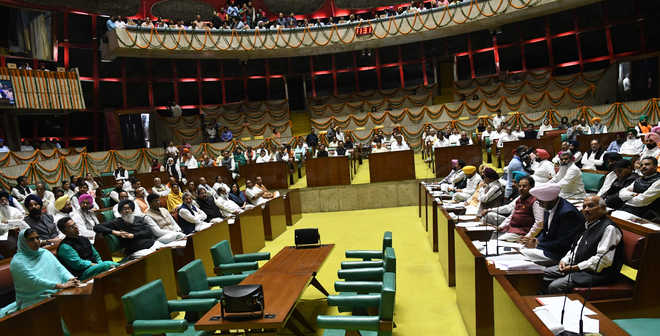The Punjab Police Rules Amendment Bill (2023) was approved by the Assembly today, overturning the Supreme Court’s ruling from July 2018 that the Union Public Service Commission must be involved in the appointment of the Director General of Police (chief of the state force).
The DGP, who was chosen by an empanelment commission, will have a definite tenure of two years; but, if he is let go early for a reason that is specified, the state may transfer the additional responsibility to another officer. The government has the authority to nominate an officer of his choosing to the post with no time restriction on extra charges.
Shiromani Akali Dal passed the bill in the face of opposition, with Congress MLAs absent because they had earlier left the chamber.
Manpreet Singh Ayali, the leader of the SAD legislative party, stated that they were against the change because the government intended to continue appointing its own officer as the DGP rather than using merit and the Supreme Court-established method.
Former DGP Prakash Singh, who advocated for police reforms and petitioned the Supreme Court for fixed tenure for officials, disagreed, claiming that the government has the authority to enact its own legislation governing the appointment and posting of the DGP.
In response to The Tribune’s inquiry, the former DGP stated, “The Supreme Court had, in its order on the selection of the DGP, said the state government could enact its own law but till then they have to involve the UPSC in the process by sending it a panel of eligible officers.”
The revised bill’s specifics show that it followed a procedure akin to the previous one, which involved the UPSC appointing an expert committee to nominate the qualified officers.
Six people will make up the committee. A former Chief Justice of the High Court of Punjab and Haryana will serve as the chairman. The other members will be the Punjab Public Service Commission Chairman or nominee, the Administrative Secretary of the Department of Home Affairs and Justice in Punjab, a former DGP, and a nominee from the UPSC.
Based on factors like length of service, a clean record, a variety of experiences, and merit, the committee will prepare a panel of the three senior-most officers from the pool of eligible officers. The government will choose the DGP from among the three officers it has selected.
Regardless of when he retires, the DGP will have a fixed term of two years. The All-India Services (Discipline and Appeal Rules, 1969) or a criminal conviction or the framing of charges in a corruption case, however, could result in an earlier loss of his or her position.
Also Read: TCS onboards 44,000 freshers in FY23, honors all job offers
Keep watching our YouTube Channel ‘DNP INDIA’. Also, please subscribe and follow us on FACEBOOK
